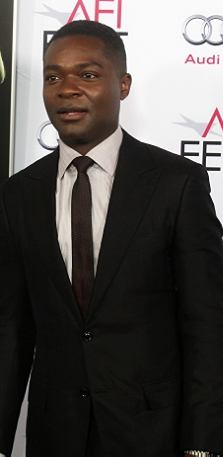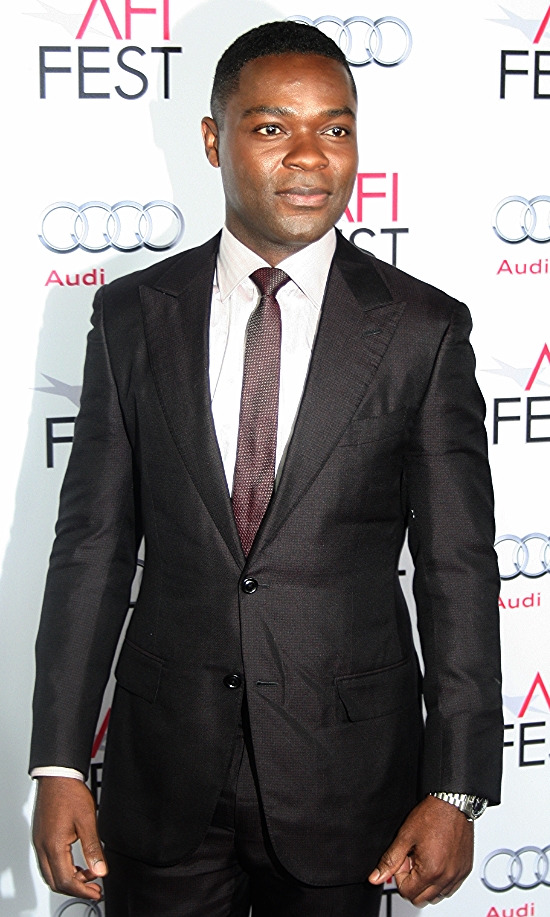
Trouble could be brewing this Oscar season inside the Brad Pitt / Angelina Jolie household. Much of Hollywood is talking up the Oscar chances of Jolie’s soon-to-open Unbroken , and yet it is quite possible that husband Brad will be walking away with his second consecutive Best Picture award for producing the moving civil rights drama Selma. Matters could get even dicier if Angelina is denied a Best Director nod for her sophomore effort, which instead would likely go to Selma’s deserving Ava DuVernay. While most awards groups would gladly throw Miss Jolie a nomination simply to have her grace their red carpets, I think the Academy’s desire to appear beneficent (not maleficent) particularly in matters concerning race will be too strong a motivation to deny DuVernay a nomination (and perhaps win). Depending on the quality of Jolie’s upcoming film, and the Academy’s recent propensity to attempt to right history’s wrongs, my feeling is that they’ll be sure to have their cake and eat it too, nominating (for the first time) two women in this historically male-dominated category.
All self-congratulatory Clooneyesque back-patting aside, the irony here is that any recognition from the Academy for Selma (and DuVernay in particular) would actually be quite deserving this time around. This passionate and long overdue telling of the politics and human cost behind Martin Luther King’s 1965 march from Selma to Montgomery, Alabama, unspooled before a very appreciative crowd at last week’s AFI Fest in Hollywood. Despite the original plan to show just a 30-minute clip from the film, after a strong push in the week leading up to the screening the final cut of the film was completed, and with the encouragement of producer (and supporting player) Oprah Winfrey, it was decided at the very last minute to screen the film in its entirety.


A sleep-deprived DuVernay (38 hours and counting, and this even before that night’s activities) took to the Egyptian Theater stage to introduce the film and apologize for the slightly rough version. She’d realized that showing the film here was one of those “full-circle” moments needing to be seized, as her first feature I Will Follow (shot for just $50,000) had screened at the 2010 AFI Fest. It was a savvy decision, and the announcement that the full version would now be shown transformed the evening into much more of an event, generating even more audience goodwill. Having Oprah Winfrey there to participate in the post-screening discussion didn’t hurt matters either, and the packed house enthusiastically reveled in the entire experience.
Selma relates a deeply moving, important chapter in America’s dark civil rights history. While the film breaks no new cinematic ground, the story it tells of the struggle for equality is of the utmost importance, and one that hopefully will reach the widest of audiences. The story focuses on the different wings of the civil rights movement in their effort to pressure President Johnson to push through Voting Rights legislation, often credited as one of Johnson’s greatest achievements in office. The film shows how LBJ had to be pushed quite forcibly, through canny strategies of King and fellow civil rights leaders, before this legislation was enacted into law. The sacrifices were mighty, the bravery of the marchers awe-inspiring, and DuVernay does well to keep the focus on the personal, showing history being made by individuals one difficult step at a time.
Not only has this struggle been greatly underrepresented in mainstream cinema, but its issues are still timely and relevant today as witnessed by the recent events in Ferguson, Missouri. Eloquent post-screening moderator Alfre Woodard mentioned that some counties in southern Alabama to this day still refuse to recognize Barack Obama as this country’s President. Whatever minor quibbles I may have with the film as a work of art, I am grateful that it was made, particularly with such passion, commitment, and honest emotion. It would be a worthy recipient of the Best Picture Oscar (much superior to last year’s winner in my opinion), and a film that one would hope might actually be a force for good in a society where racism is still sadly quite alive.

Selma succeeds as a historical testament in large part due to the uniformly excellent group of actors assembled to vividly bring these characters to life. I should qualify that by saying the ensemble of African-American actors … as I felt most of the white characters came across as somewhat one-dimensional cliches. Ever since Vivien Leigh’s triumph as Scarlett O’Hara, British thespians have been drawn to playing characters from America’s South, but in Selma’s case Tom Wilkinson and Tim Roth (as President Lyndon Johnson and Governor George Wallace, respectively) seemed woefully miscast, while Martin Sheen was simply distracting (and unnecessary in this small role). To be honest, Oprah was distracting as well, but when you’re a producer as powerful as she you’ll likely get no argument about being added to the cast, and it’s completely understandable why she’d want to be a part of this project. Producer Brad Pitt’s acting in 12 Years a Slave last year was a similar distraction, so I hope this trend doesn’t continue (though the encouragement of the Academy appears not to be helping).
But the person likely to walk away with acting honors from Selma will of course be David Oyelowo as Martin Luther King Jr. The British-Nigerian actor (who impressed as Oprah’s son in The Butler last year) inhabits the role of the great civil rights leader, and does an excellent job passionately orating many of Dr. King’s rousing speeches. His performance is akin to what yet another English actor recently achieved portraying an iconic American leader – Daniel Day-Lewis as Lincoln – an accomplished act of mimicry if nothing else. I was not as moved by his performance as I’d hoped to be, but he succeeded in convincing me he was Martin Luther King, which is no small feat. My favorite performance was a small one by Henry G. Sanders as Cager Lee, father of a murdered youth (the excellent Keith Stanfield of Short Term 12). The close-up of Sanders’ face in an emotional scene at the morgue spoke volumes, and the dignity and pain he conveyed summed up the essence of the struggle more than any words might say.

Both Ava DuVernay and Oprah Winfrey credited David Oyelowo as the reason they initially came on board the Selma project, with DuVernay citing him as “one of the most exquisite human beings I’ve ever met.” This is obviously Mr. Oyelowo’s moment, and one apparently foretold to him by God seven years ago. “Very soon after my wife and I moved to this country,” related Oyelowo, “I was told from above that I would play this role. On the 24th of July, 2007. And I couldn’t believe it, so I wrote it down (that’s how I know the date). The director at the time didn’t agree with that higher power. And a process of my birth, my experiences, my faith, time, and these incredible people have led me to this moment.” He spoke of praying with the cast and extras, of being in the midst of divine moments, “being held by elements beyond ourselves.” I suspect we may be hearing this story more than a few times this awards season, and I hope Benedict, Michael, and Eddie aren’t too disheartened now that we know the Big Guy’s already in David’s corner.
Oyelowo is an eloquent, if righteous, speaker who related what he had come to realize during the seven years he lived in Nigeria. While likely not altogether spontaneous, his words inside the Egyptian Theater (appropriately) that evening were quite powerful. “We are born of kings, and we are a people of deep pride, incredible culture, and indescribable power. And unfortunately on the continents of both Europe and America that’s been denigrated over time. And I don’t think it’s any accident that somehow this great man’s name was ‘King’.”

Ava DuVernay ended the discussion with a smaller, more intimate observation, one which for me packed an even greater punch. “My father is from Alabama,” she said. “One of the proudest moments of my life was when my Dad got off of work – he delivers mail from the mail truck in Montgomery, Alabama – and he got off work, a night shift, and drove down to downtown Montgomery. His daughter had shut down the streets of the Capitol! And he had a police escort walk him up to the Capitol steps, and had a little chair for him to sit … and it’s just … that face …” DuVernay had trouble containing her feelings at that point, and the audience erupted in applause. Her pride and emotion that he was able to witness such change and progress in little more than a generation, knowing the sacrifice with which it was achieved, truly was a touching moment. And with absolutely no disrespect for the filmed drama that she has so beautifully created, for me the most emotionally moving part of Selma is at the very end, when the film switches to actual 1965 newsreel footage of the marchers being beaten, being degraded, and yet proudly enduring their struggle to overcome. Combined with the haunting, Oscar-bound song by Common and John Legend which plays over these images, the emotional heft of the moment and of the evening was palpable, and the standing ovation and shouts of approval from the audience which followed could be heard even from the streets outside the theater.
All fest photos by Steve Striegel, exclusively for ICS
